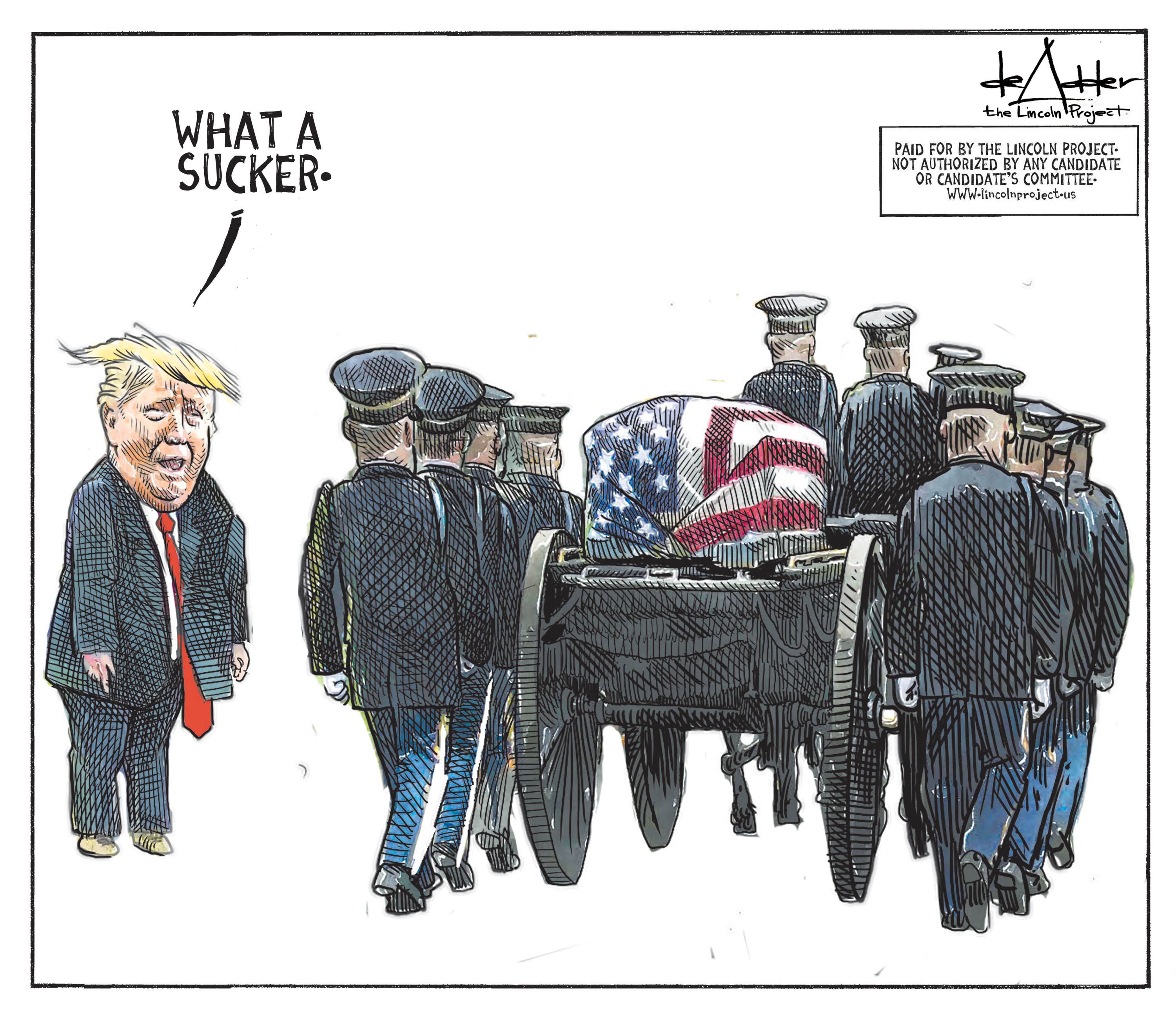Another uncle served a 20+ year career as an Air Force officer, including in Vietnam.
His son, my cousin Jim, graduated from the Air Force Academy and served a 20+ year career as an officer. He has two sons, one of whom is serving as an officer in the Army and the other as an officer in the Air Force.
My former husband is also an Air Force Academy graduate and served a 20+ year career as an officer.
Jim's sister Terry's youngest son graduated from Air Force and is now serving as an Air Force officer.
My niece's husband's brother served a two-year enlistment in the Air Force and is now in the Reserves. Starting last November he was deployed for six months in the Middle East.
There are no words strong enough to express my rage.
Donald Trump called our fallen troops "suckers" and "losers."— VoteVets (@votevets) September 4, 2020
They can't speak for themselves, but these 6 Gold Star families speak for our fallen.
Here is their POWERFUL message.#GoldStarParentsAgainstTrump #VeteransAgainstTrump pic.twitter.com/ZnbFevqkNR
Donald Trump thinks these heroes are losers. pic.twitter.com/BDaadXsWVU— The Lincoln Project (@ProjectLincoln) September 4, 2020
Mr. President, if you don’t respect our troops, you can’t lead them. pic.twitter.com/hcX9hGgdm5— Joe Biden (@JoeBiden) September 4, 2020
We are sickened by the callousness and disdain this man has for men with more courage in their pinky toes than he does in his bone spurs. #nohonor https://t.co/UXssaO1Or5— 43 Alumni for Biden (@43Biden) September 3, 2020
This is from 2013:
Happy Veterans Day to ALL, in particular to the haters and losers who have no idea how lucky they are!!!— Donald J. Trump (@realDonaldTrump) November 11, 2013

Update: This is a tweet thread that was posted this afternoon. What makes it interesting is that it's from Jennifer Griffin, a National Security Correspondent for Fox News:
Two former sr Trump admin officials confirm .@JeffreyGoldberg reporting that President Trump disparaged veterans and did not want to drive to honor American war dead at Aisne-Marne Cemetery outside Paris.
According to one former senior Trump administration official: "When the President spoke about the Vietnam War, he said, 'It was a stupid war. Anyone who went was a sucker'."
This former official heard the President say about American veterans: "What's in it for them? They don't make any money." Source: "It was a character flaw of the President. He could not understand why someone would die for their country, not worth it."
I read the source a few quotes from The Atlantic article. This former Trump admin official said, "The President would say things like that. He doesn't know why people join the military. He would muse, 'Why do they do it'?"
Re: trip to mark 100th anniversary of WW I
Source: "The President was not in a good mood. Macron had said something that made him mad about American reliability and the need perhaps for a European army. He questioned why he had to go to two cemeteries. 'Why do I have to do two'?"
President Trump's staff explained he could cancel (his visit to the cemetery), but he was warned, 'They (the press) are going to kill you for this'." The President was mad as a hornet when they did.
When asked IF the President could have driven to the Aisne-Marne Cemetery, this former official said confidently:
"The President drives a lot. The other world leaders drove to the cemeteries. He just didn't want to go."
Regarding Trump's July 4th military parade, during a planning session at the White House after seeing the Bastille Day parade in 2017, the President said regarding the inclusion of "wounded guys" "that's not a good look" "Americans don't like that," source confirms.
Regarding McCain, "The President just hated John McCain. He always asked, 'Why do you see him as a hero?" Two sources confirmed the President did not want flags lowered but others in the White House ordered them at half mast. There was a stand off and then the President relented.
Update #2 on Saturday morning. Another tweet thread that touched me, from Army veteran Charlotte Clymer. She includes some details about a very specific process that I didn't know very much about:
The straight line distance between Washington, D.C. and Dover, Delaware is less than 85 miles. It takes a helicopter about 40-45 minutes to make the trip. I was 19 years-old, and it was my first time riding a helicopter. I barely remember any of it. I was distracted.
I was more nervous than I've ever been in my life about what was to come next, and so, as this Black Hawk floated above the earth with my casket team--me being the youngest and most junior--I could only think: "What if I mess this up? What if I fail? How will I live with myself?"
That's how it should be in a moment like this. You should be nervous. You should let that sharpen your focus. Because there is no room for error when handling the remains of a service member returning to the U.S. after being killed in combat. You should strive for perfection.
The helicopter landed, and my anxiety spiked. In retrospect, I recall noticing the silence of the rest of the casket team. These were young men, mostly early 20s, loud and boisterous and chests puffed. Now, they were quiet. It was unnerving.
When you're a new enlisted soldier in an infantry unit--the FNG--you're treated like you know nothing. Because you don't. Everyone around you is older and vastly more competent and confident. Yet, in this moment, despite having done this before, they were all nervous, too. Scary.
We were brought into a holding area near the tarmac on Dover Air Force Base in Delaware, where the remains of service members who have died in a theater of operations arrive on a C-17 transport plane. We rehearsed our steps. And did it again. And then again. No room for error.
The plane arrived. The ramp was lowered. The transfer vehicle that would complete the next leg of the journey was parked. Our casket team was positioned. We were now each wearing ceremonial white cotton gloves we had held under the bathroom faucet. Damp gloves have a better grip.
We’re a casket team, but these are not caskets. They're transfer cases: rectangular aluminum boxes that bear a resemblance to a crate for production equipment. Yet, the dimensions are obvious. Any given civilian would take only a few moments to realize that's for carrying bodies.
It's called a "dignified transfer", not a "ceremony", because officials don't want loved ones to feel obligated to be there while in mourning, but it is as highly choreographed as any ceremony, probably more so. It is done as close to perfection as anything the military does.
I was positioned in formation with my casket team, and I could see the transfer cases precisely laid out, dress right dress, in the cavernous space of the C-17, each draped with an American flag that had been fastened perfectly. I remember my stomach dropping.
There is simply no space for other thoughts. Your full brain capacity is focused on not screwing up. The casket team steps off in crisp, exact steps toward the plane, up the ramp (please, oh god, don't slip), aside the case, lift up ceremonially, face back and down the ramp.
During movement, everyone else is saluting: the plane personnel, the OIC (officer-in-charge), any senior NCOS and generals, and occasionally, the president. The family is sometimes there. No ceremonial music or talking. All silent, save for the steps of the casket team.
You don't see the family during this. You're too focused. There are other distractions. Maybe they forgot, but no one told me there'd be 40-60 lbs. of ice in the transfer case to prevent decomposition over the 10-hour plane ride. You can sometimes feel it sloshing around a bit.
Some of the transfer cases feel slightly heavier, some slightly lighter. The weight is distributed among six bearers, so it's not a big difference. But then you carry a case that's significantly lighter, and you realize those are the only remains they were able to recover.
It probably takes all of 30-40 seconds to carry the transfer case from the plane to the mortuary vehicle, but it felt like the longest walk ever each time. The case is carefully placed in the back of the mortuary vehicle, and the casket team moves away in formation.
I don't know how to describe the feeling after you're done and on your way back to D.C., but it's a mixture of intense relief that you didn't screw up and profound sobriety over what you've just done and witnessed. I wouldn't call it a good feeling. Maybe a numbed pain.
From the outside, the most egalitarian place in America is a military transfer case. They all look exactly the same: an aluminum box covered with the American flag. We didn't know their names, rank, race, ethnicity, gender, religion, sexual orientation--none of it. All the same.
Whatever cruel and unfathomable politics had brought all of us to that moment--from the killed service member in the box to those of us carrying it to the occasional elected official who attends to pay respects--there were no politics to be found during a dignified transfer.
The fallen service members I helped receive and carry during this part of the journey to their final resting place were not "losers" or "suckers". They were selfless and heroic, and I had the honor of being among the first to hold them when they returned home.
There are service members around the world involved in caring for our war fatalities. The mortuary specialists, the casket teams, the family liaisons--so many people who work to ensure that this final act is done with the greatest amount of dignity and honor, seeking perfection.
I suppose the one thing we all took for granted is that dignity would always be affirmed by all our civilian leaders to those service members who gave everything. I never would have predicted any official, let alone a sitting president, would insult fallen service members.
I cannot adequately describe my anger at Donald Trump for being so willing to send service members halfway around the world to die on his own behalf and then call them "losers" for doing so. This coward is unfit for his office and the power it holds. He needs to go.


No comments:
Post a Comment